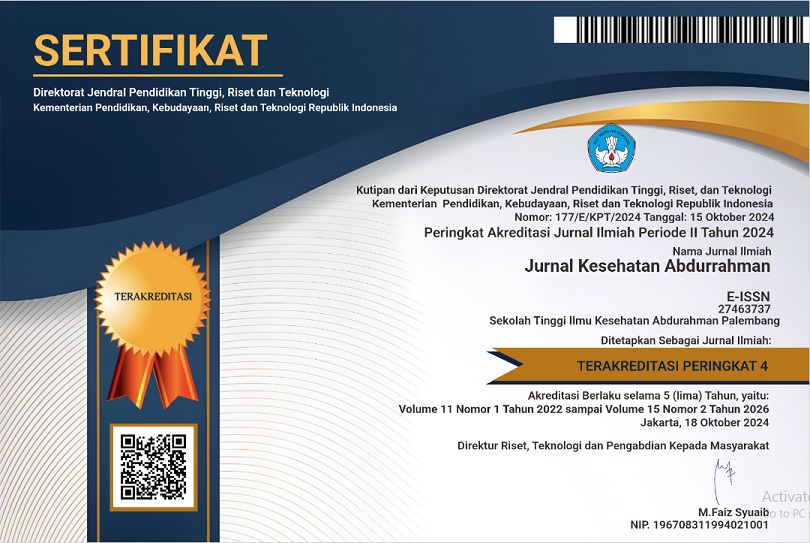HUBUNGAN PENGETAHUAN DAN PENDIDIKAN AKSEPTOR KB TERHADAP KEPATUHAN KONSUMSI KB PIL DI BPM CH. MALA PALEMBANG
Abstract
Compliance with the consumption of contraceptive pills is the extent to which the patient's behavior is in accordance with the provisions given by health personnel Birth control pills must be taken every day. The failure of acceptors of birth control pills can be caused by the lack of compliance of acceptors in taking the Pill. The aim of this study was to determine the relationship between knowledge and education of family planning acceptors on compliance with the use of birth control pills in BPM CH. Mala Palembang in 2017. The design of this research is quantitative research using analytical survey method with cross sectional design. The population in this study were all family planning pill acceptors who came to BPM CH. Mala Palembang, namely 46 people. The number of samples in this study is the entire population, namely 46 people. Based on the results of univariate analysis who have good knowledge of 28 people (60.9%) while those who have less knowledge are 18 people (39.1%) and the Chi Square statistical test, it turns out that p value = 0.006 <0.05. (OR) = 7,333. The results of the univariate analysis that 29 people (63%) had higher education, 17 people (37%) had low education and the Chi Square statistical test, it was found that p value = 0.002 <0.05. Odds Ratio (OR) = 9.2. This shows that there is a significant relationship between knowledge and education on adherence to the consumption of birth control pills. Suggestions in this study are expected that health workers can improve health education about how to take birth control pills, what will happen if you forget to take birth control pills and how to overcome them if you forget to take birth control pills.
References
Fasha, (2014). Factor internal yang berhubungan dengan pengetahuan tentang kontrasepsi oral. http//jurnalkebidanan. Diakses 01 maret 2017
Handayani, Sri. (2010). Buku ajar pelayanan keluarga berencana. Yogyakarta : Pustaka Rihama
Hartanto, (2004). Keluarga berencana dan kontrasepsi. Jakarta : Mulia Sari
Irianto, (2014). Pelayanan keluarga berencana dua anak cukup. Bandung : Alfabeta
Kartikasari, Anisa. 2014. “Hubungan kepatuhan akseptor KB Pil dengan keberhasilan pencegahan kehamilan”. Jurnal kebidanan Vol.02, No.XVIII. Juni 2014
Kusumah, (2016). Pengetahuan akseptor KB pil oral dengan kepatuhan konsumsi KB pil. http//jurnalkebidanan. Jurnal Involusi Kebidanan, Vol. 4, No. 8, Juni 2014
Kundre, dkk. (2015). Pengetahuan ibu dengan kepatuhan minum KB pil. http//jurnalkebidanan. Diakses 01 maret 2017
Manuaba, dkk. (2013). Ilmu penyakit kandungan dan KB. Jakarta : EGC
Notoatmodjo, Soekidjo. (2005). Metodologi penelitian kesehatan. Jakarta : Rineka Cipta
Notoatmodjo, Soekidjo.(2010). Kesehatan masyarakat ilmu dan seni. Jakarta : Rineka Cipta
Prawirohardjo, Sarwono. (2009). Pelayanan kesehatan maternal dan neonatal. Jakarta : PT Bina Pustaka
Prawirohardjo, Sarwono. (2011). Buku panduan praktis pelayanan kontrasepsi. Jakarta : PT Bina Pustaka
Priyanti, (2013). Konsumsi KB pil. http//jurnalkebidanan. Diakses 01 maret 2017
Pudiastuti, Ratna. (2012). Asuhan kebidanan pada hamil normal dan patologi. Yogyakarta : Nuha Medika
Sandrinita, (2014). Pemberian konseling terhadap ketetapan pemilihan alat kontrasepsi. http://jurnalkebidanan. Diakses 10 Desember 2015
Sugiyono. (2009). Metode penelitian bisnis (pendekatan kuntitatif, kualitatif, dan R&D). Bandung : Alfabeta
Sulistiawaty. (2012). Pelayanan keluarga berencana. Jakarta : Salemba Medika
Supriyadi. (2014). Statistik kesehatan. Jakarta : Salemba Medika
Syafrudin, dkk. (2011). Penyuluhan KIA. Jakarta : Trans Info Media








